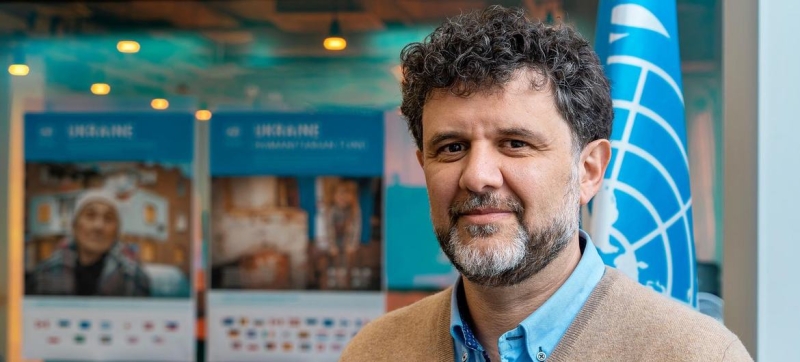
Head of the Ukrainian office of the UN Office for the Coordination of Humanitarian Affairs (OCHA) Andrea De Domenico. INTERVIEW | Ukraine: UN representative on the priorities of the humanitarian community in conditions of war and the coming winter Humanitarian assistance
With winter approaching, the situation in the front-line regions of Ukraine is becoming more and more difficult. The head of the Ukrainian office of the UN Office for the Coordination of Humanitarian Affairs (OCHA), Andrea De Domenico, said this in an interview with the UN News Service.
“Winter is approaching and weather conditions are getting worse every day, so one of our priorities is to support people, especially those who are vulnerable, so that they are prepared for the winter period,” De Domenico said. The number of locations exposed to shelling on a daily basis is growing. “These daily attacks are hitting civilian infrastructure. It is especially alarming to see attacks on critical energy facilities, which make winter survival even more difficult,” the UN official added.
August and September, he added, saw massive population movements due to pressure on the front lines. “The situation is particularly alarming in towns close to the front lines, where civilians have to constantly flee just to survive,” De Dominico said.Last week, a UN humanitarian convoy came under fire in the Kherson region, and two trucks caught fire. These are the realities of war – this year alone, about a hundred attacks on humanitarian operations have been recorded. However, according to De Dominico, apart from the attack on IAEA staff, this is the first time a United Nations humanitarian mission has been directly attacked. Humanitarian workers, as an OCHA spokesman noted, “were shocked” but continued to work. “Risk is part of the environment in which we live. This is what a humanitarian operation looks like in a war zone,” he said, adding that the UN has developed clear security protocols that help protect the lives and health of personnel.
De Domenico emphasized the role of local partners, who bear the brunt of relief efforts: “Most humanitarian assistance is delivered by local authorities and partners. We commend them for the fantastic work they do every day.”
Priorities and resource constraints
“We are driven solely by the needs of the people,” said the head of the OCHA office, speaking about the deployment priorities in conditions of limited resources. He named the main directions of providing assistance along the front line, supporting evacuations, responding to the consequences of airstrikes and helping internally displaced people. “This is a collective effort to set priorities and a collective effort to deliver aid to the millions of Ukrainians who need support,” De Domenico said.
Read also:
INTERVIEW | Ukraine: how humanitarian support from the UN and its partners helps Ukrainian civilians survive
A special role, he said, is played by local authorities, public and voluntary organizations: “We cooperate with numerous civil society organizations dedicated to helping people. We are trying to provide the resources necessary to move huge amounts of aid – after all, there are at least a million people living along the front lines in need of support.” in the summer because it takes time to prepare,” De Domenico said. The main focus is on front-line areas, where the most vulnerable groups remain – elderly people, many of whom have difficulty moving. “The programs are now operating at full capacity, humanitarian partners and UN agencies are already delivering assistance,” he said.
However, a new wave of attacks on energy infrastructure poses additional challenges. “We see that 60 percent of gas production enterprises have been damaged, and the electricity supply system has been damaged. Without water and electricity, it is very difficult for people to survive in winter,” the UN official noted.
“We need more support from the international community to cope with this challenge,” he added.
In total, he said, the UN humanitarian plan designed to help six million people, and by the end of August had reached almost four million of them. “We requested $277 million to prepare for winter, and approximately 50 percent of this amount was mobilized,” De Domenico said. “If we do not receive the rest of the amount, it means that people will not be able to stay in their homes and will have to evacuate. This is the only way out,” he noted.
Most people do not want to travel far from their homes: “People tend to stay close to home, this is natural. But as the front gradually shifts and the range of attacks increases, they are forced to move again.”
The most vulnerable displaced people are being housed in collective centers supported by both the government and humanitarian organizations, according to an OCHA spokesman. “Humanitarian Coordinator Matthias Schmale recently allocated additional resources to support such centers through the Humanitarian Fund for Ukraine. It is extremely important for us to continue to receive funds in order to flexibly and quickly direct them to where help is most needed,” said De Domenico.
“The Face of War”
When asked about personal impressions received while traveling around the country and communicating with Ukrainians, Andrea De Domenico said: “When I began to systematically go to the front line and meet people, I realized that war has the same color, the same smell and the same sound as in other places. The peculiarity of Ukraine is that the elderly suffer especially here. The young were able to leave [from the front-line areas], but the old remained.”
“When they have to evacuate, you see the pain in their eyes and the realization that they may never return home. It’s horrible. And this is the price of war, the face that it has here,” he concluded.
